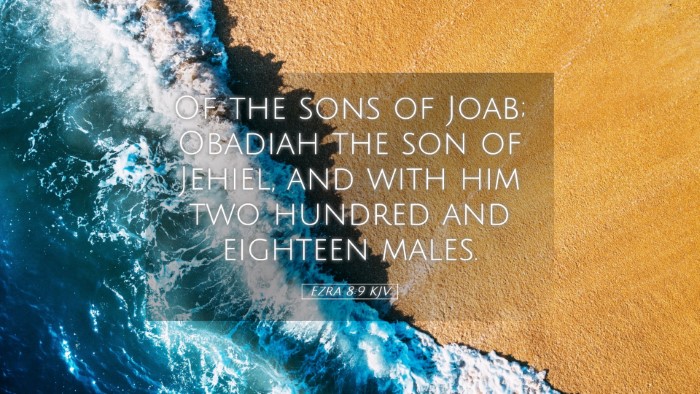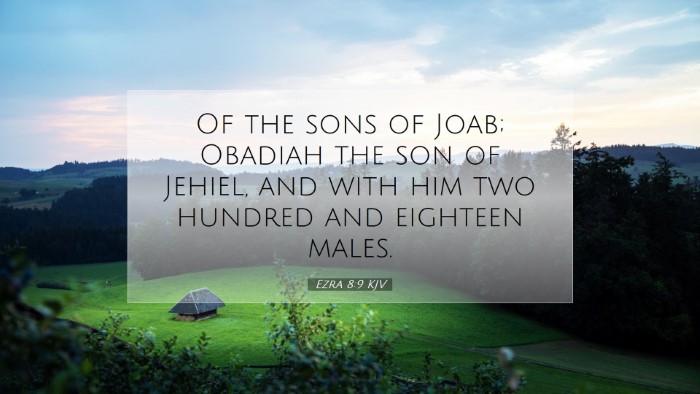Commentary on Ezra 8:9
In Ezra 8:9, we encounter a poignant moment in the narrative of the return to Jerusalem after the Babylonian exile. This verse reads: "Of the sons of Jonathan, the son of Abishua, and of the sons of Phinehas; Eyer and the sons of Abiathar, whom David had appointed priests, and this was shared." This commentary seeks to summarize the insights of renowned public domain scholars like Matthew Henry, Albert Barnes, and Adam Clarke, providing a meaningful exploration of this verse for pastors, students, theologians, and Bible scholars.
Context and Background
Ezra 8 describes the return of the exiles from Babylon to Jerusalem, under the leadership of Ezra. This event is significant as it marks the spiritual and physical restoration of the Jewish people. The emphasis on heritage in Ezra highlights the roles of priests and Levites, who were critical in re-establishing temple worship and the community's spiritual life.
Analysis of Ezra 8:9
This verse is part of a genealogy that aims to establish the legitimacy and authority of Ezra and his companions. The detailed listing of ancestors signifies the importance of priestly lineage:
- Spiritual Authority: Ezra’s lineage, tracing back to Phinehas, reinforces his spiritual authority as a priest. This is essential for institutionalizing worship and restoring the Law.
- Importance of Heritage: The mention of Jonathan and Abishua illustrates the continuity of priesthood and the ongoing covenantal relationship between God and His people.
- Leadership Roles: The inclusion of specific individuals highlights their appointed responsibilities, indicating a well-structured community ready for worship and obedience.
Insights from Public Domain Commentaries
Matthew Henry's Commentary
Matthew Henry provides a rich exegesis of the text, underscoring the significance of Ezra’s priestly lineage. He reflects on the reality that the priesthood was not merely a hereditary appointment, but a divine calling. Henry notes the necessity for leaders to come from legitimate lines to foster trust and respect within the community.
Albert Barnes' Notes
Albert Barnes emphasizes the historical and theological implications of the genealogy. He elaborates on the character of those named, particularly pointing out the stature and faithfulness of the priests chosen by David, reinforcing that the return to Jerusalem is not just a physical journey but also a restoration of religious integrity and identity.
Adam Clarke's Commentary
Adam Clarke takes a detailed approach to unpacking the relationships in this genealogy. He highlights the significance of the names involved, acknowledging that they are not just historical records but reminders of God’s faithfulness through generations. Clarke discusses how these connections serve to inspire both the original audience and contemporary believers about God's active role in the life of His people.
Theological Reflections
- God’s Faithfulness: The genealogical records serve as a testament to God's unwavering promise to Israel. The lineage serves to remind the community that God maintains His covenant across generations.
- Priesthood and Spiritual Leadership: This passage teaches the importance of having qualified leaders—those who adhere to God’s standards—not only in rites but in moral integrity and community life.
- Restoration and Renewal: Ezra's return signifies hope and renewal for the exiles, and invites reflection on how God can restore individuals and communities today.
Practical Applications
Ezra 8:9 can guide contemporary believers in several ways:
- Valuing Heritage: Just as Ezra’s lineage was crucial, modern believers are encouraged to honor their spiritual heritage and recognize how God has worked through previous generations.
- Leadership in the Church: Understanding the significance of qualified leadership in the church can inspire congregations to seek out and support individuals who have a proven commitment to spiritual integrity.
- Embracing Restoration: Individual and communal restoration is a theme echoing through Scripture. Believers can find comfort in God’s ability to restore and use them regardless of their past.
Conclusion
In summary, Ezra 8:9 is more than a historical note; it is a crucial verse that reflects themes of heritage, leadership, and divine faithfulness. Through the insights of scholars like Matthew Henry, Albert Barnes, and Adam Clarke, we gain a deeper understanding of the implications this verse holds for God's people both in the past and today. As we consider our own journeys of faith, it is essential to remember the importance of our spiritual heritage, the roles of qualified leaders, and the hope of restoration.


